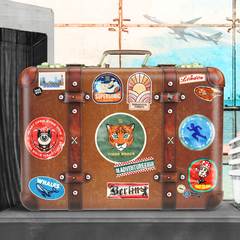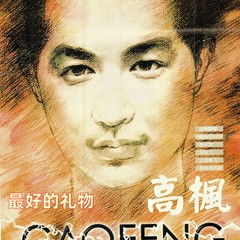Ethel Merman
小简介 艾索尔·摩曼可以称得上是20世纪百老汇音乐剧舞台上最伟大的女演员之一。她那动人的歌声在百老汇的舞台上回荡了半个多世纪。她在百老汇的初次登台是在1930年格什温的《疯狂姑娘》中演唱“’I Got Rhythm”,而她在纽约的最后一次露面是1982年参加了在卡耐基音乐厅的一次演唱会。 艾索尔·摩曼共出演了16部作品。自从在《姑娘疯狂》(Girl Crazy)中一炮打响后,她接连主演了《安妮,拿起你的枪》(Annie Get Your Gun)和《玫瑰舞后》(Gypsy),从而一举奠定了她在演出界的地位。 摩曼于1908年1月16日出生在纽约皇后大道的亚斯托利亚(Astoria)街区,她的父亲是德国人,母亲是苏格兰人。摩曼自小就跟着喜欢政治的父亲出没于政治俱乐部和社团集会,那时的她已经开始喜欢上唱歌了,许多童谣和流行的短歌经常挂在她的嘴边。 她在结束了高中的商贸学业之后,找到了一个速记员的工作。但是摩曼坚信她不可能就这么平凡的度过一生,对于将来成为一名歌手乃至歌星她始终抱有坚定的信心。所以,在听说另外一家公司的老板同演艺界的人物有来往的消息后,她立刻辞去了速记员的工作而转投到了那家公司。 公司的老板曾经为摩曼写了一封推荐信,百老汇的一位制片人同意让她参加合唱队,志不在此的摩曼立刻拒绝了这个邀请。她立志要成为一名出色的歌唱家。当她和朋友一起去剧院观看了当红的歌舞剧后,她更加坚定了自己的发展方向。她经常自己模仿剧中人物的唱腔和对白,感觉自己比他们唱得要好的多。 在担任秘书的同时,摩曼又找到了一份在夜总会演唱的工作机会。这时,一位代理商,卢·艾尔文(Lou Irwin),帮助摩曼同时代华纳签订了一份为期六个月的演唱合同。但好莱坞是不会将这个无名小辈当作歌唱家来培养的。为了得到更好的演出机会,为了争取时代华纳同意自己在合同期间可以在其他地方演唱摩曼,不惜以放弃自己报酬来换取。这样,她可以在工作之余继续在夜总会演唱。 就这样,摩曼只拿着相当于华纳一半的薪水——每周85美元,辗转演唱于几家夜总会。她的演唱技巧和心理素质在此期间得到了很大的提高,为她今后的成名打下了坚实的基础。摩曼的好运气也逐渐来临,她被邀请到布鲁克林的派拉蒙(Paramount)剧院演唱,并且迅速成为这里的台柱子。 到了1930年,摩曼经过几年夜总会演唱的锤炼和在布鲁克林的演出,对于演出舞台已经非常熟悉了。她站在派拉蒙剧场的舞台,只要一开口,那迷人清亮的歌声就会从中流淌出来,传遍剧场的每个角落。弗雷德利(Vinton Freedley),《姑娘疯狂》的制片人,在一次偶然观看了摩曼的演出后,说服乔治·格什温给她一次试唱的机会。格什温立刻被她的出众的嗓音和音色所征服,让她参加这部由霍华德(Willie Howard)和罗杰斯(Ginger Rogers)担纲的新剧作。 摩曼在百老汇的第一次登台就取得了空前的成功,这也为她成功的演艺生涯带来了传奇性的开端。在首演的舞台上,面对着挑剔的观众,初次登上音乐剧舞台的摩曼毫无怯意,就像往日演唱一样,将一首“I Got Rhythm”作为自己的“介绍信”献给了观众。当她那高亢但不刺耳的高音飘荡在剧院上空的时候,每一位观众都不由得发出由衷的赞美。当舞台的大幕刚刚落下,格什温冲进后台高兴的说:“不要让任何人再教你演唱技巧了,那只会让你退步”。 在《疯狂姑娘》中取得巨大的成功之后,摩曼再接再厉参加了多部剧作的演出,这其中包括乔治·怀特(George White)的《丑闻》(Scandals)、科尔·波特的《红与蓝》(Red Hot and Blue)、《抓住机会》等。 摩曼在1946年艾尔文·伯林的《安妮,拿起你的枪》中获得了更大的声誉,这部作品上演超过了1000场,而摩曼所演唱的“There’s No Business Like Show Business”更是成为音乐剧中的经典。by William RuhlmannEthel Merman was the leading American musical theater performer of her generation, creating roles in 13 Broadway musicals between 1930 and 1959, and continuing to appear in shows occasionally through 1970. Her clarion voice and exact enunciation were perfect for an era when a stage performer was required to sing loud enough to be heard at the back of the theater without amplification. That made her a favorite of the leading songwriters of the day, and she introduced some of the most memorable songs of George Gershwin, Cole Porter, and Irving Berlin. Her Broadway stardom, at a time when the musical theater was a major source for American popular music, nationally afforded her opportunities in other areas of entertainment including personal appearances, records, movies, radio, and television. But her real home was on the Broadway stage, and that's where she spent the bulk of her time for 40 years. Merman began singing as a child and entertained at military camps during World War I. She became a secretary after graduating from high school, but gradually built up a career singing in nightclubs and vaudeville. In September 1930, she reached the pinnacle of vaudeville success, playing the Palace Theater in New York. By then, however, she was already preparing to make a transition to the legitimate theater, and on October 13, 1930, she opened in a featured role in the Broadway musical Girl Crazy, with songs by George and Ira Gershwin, attracting considerable attention with her performance of "I Got Rhythm." The show ran 272 performances, closing June 6, 1931, and she found time during its run to continue her nightclub appearances and to work at New York's Paramount Pictures studios, where she appeared in short films, and then made her feature film debut in Follow the Leader, released in December 1930. On September 14, 1931, she opened in her second Broadway show, that year's edition of the revue George White's Scandals, introducing "Life Is Just a Bowl of Cherries." It ran 202 performances, closing March 5, 1932. On October 1, 1931, she made a test recording of "Life Is Just a Bowl of Cherries" for RCA Victor Records, but she did not make her first issued recordings until a Victor session a year later, on September 29, 1932, that produced a version of Irving Berlin's "How Deep Is the Ocean?" Over the next several years, she made occasional further recordings, for Brunswick Records in 1934 and 1935, for Liberty Music Shop Records in 1939, and for Decca Records in 1940, usually performing songs associated with her shows and films. But recordings accounted for only a small part of her work. Merman opened in her third Broadway musical, Take a Chance, on November 26, 1932, her most memorable song being "Eadie Was a Lady." The show ran 243 performances, closing July 1, 1933. In September, she went to Hollywood, where she co-starred with Bing Crosby in We're Not Dressing and with Eddie Cantor in Kid Millions, both films released in 1934. (Footage of her singing "It's the Animal in Me," shot for We're Not Dressing, was used in the 1935 film Big Broadcast of 1936.) After a year, she returned to New York and her greatest stage success yet, starring in the Cole Porter musical Anything Goes, which opened November 21, 1934, and ran 420 performances, closing November 16, 1935. Her songs included "I Get a Kick Out of You," "You're the Top," and the title tune. Unusually for her, she left the show before its closing to fulfill more film commitments in Hollywood, again co-starring with Cantor, in Strike Me Pink, and Crosby, in a screen adaptation of Anything Goes, both released in 1936. Then her bicoastal career continued back in New York with another Cole Porter offering, Red, Hot and Blue!, which opened on Broadway on October 29, 1936, for a run of 183 performances, closing April 10, 1937. Among her six songs in the show were "Down in the Depths on the 90th Floor" and "It's De-Lovely." Returning to Hollywood, she signed with 20th Century-Fox and made three films released in 1938, Happy Landing, Alexander's Ragtime Band (which featured vintage songs by Irving Berlin), and Straight, Place and Show. This turned out to be her last extended work in films. Turning 30, and with only ordinary looks, she had no real chance of being a big Hollywood star, but her voice guaranteed her above-the-title status back on Broadway. Accordingly, Merman headed back east again for her sixth stage musical, Stars in Your Eyes, which featured songs written by Arthur Schwartz and Dorothy Fields. It opened February 9, 1939, for a run of only 127 performances, closing May 27, and by December 6, Merman was back on-stage in Cole Porter's DuBarry Was a Lady, a more successful effort that ran 408 performances, staying on the boards until December 12, 1940. Before then, she had left it to open in another Porter show, Panama Hattie, on October 30, 1940. This musical gave her longest run yet, 501 performances, closing on January 3, 1942. She had married theatrical agent William Jacob Smith in 1940 and divorced him in 1941, then married newspaperman Robert Daniels Levitt. With him, she gave birth to her first child, Robert Daniels Levitt, Jr., on July 20, 1942. On January 7, 1943, she was back on Broadway, singing Cole Porter songs in Something for the Boys, which ran 422 performances, closing January 8, 1944. (During the year, she made a cameo appearance in the all-star film Stage Door Canteen, and she made her first appearance in the Billboard singles chart with "Move It Over" on RCA Victor.) On August 11, 1945, Merman gave birth to her second child, Ethel Levitt. Her tenth stage musical was the biggest hit of her career, Irving Berlin's Annie Get Your Gun, a depiction of the life of sharpshooter Annie Oakley. Opening May 16, 1946, it ran 1,147 performances, until February 12, 1949, and she stayed in it until the end, singing "Doin' What Comes Natur'lly," "They Say It's Wonderful," "Anything You Can Do," "I Got the Sun in the Morning," and "There's No Business Like Show Business," among other songs. The original Broadway cast album had become a commercial entity in the time since her last stage appearance, and the cast album for the show, released on Decca, reached number two in the charts. This recording success increased her profile, and she was given her own network radio series, The Ethel Merman Show, which ran during 1949. She also signed an exclusive recording contract with Decca and scored a series of chart entries in 1950 and 1951 paired with fellow stage star Ray Bolger: "Dearie," "I Said My Pajamas (And Put on My Pray'rs)," "If I Knew You Were Comin' I'd've Baked a Cake," and "Once Upon a Nickel." On October 12, 1950, Merman returned to Broadway in Irving Berlin's next musical, Call Me Madam. It ran 644 performances, until May 3, 1952, and she won a Tony Award. RCA Victor owned the rights to the original Broadway cast album, but she was still under contract to Decca. As a result, the rest of the original cast, with Dinah Shore substituting in the starring role, recorded an album for RCA, while Merman and a quickly assembled studio cast including Dick Haymes recorded a competing one for Decca. Merman's version outscored Shore's, reaching number two in the charts, with her duet with Haymes on "You're Just in Love" reaching the singles charts. Despite her increased national profile, Merman had not returned to movie making. Broadway audiences may have had no trouble accepting her as the youthful Annie Oakley in Annie Get Your Gun, but moviegoers would have been required to swallow their disbelief had the 42-year-old tried to star in the 1950 movie version. (As it was, MGM never asked her, first giving the role to Judy Garland, who dropped out due to illness, and then to Betty Hutton.) But the role of Sally Adams, the Perle Mesta-like "Hostess with the Mostes' on the Ball" in Call Me Madam, was a matronly one, and Merman did get to appear in the film version, which was released in 1953, her first starring movie role in 15 years. The soundtrack album on Decca reached number five. Merman did not immediately go back into a Broadway show, first acknowledging the rise of television by making a number of small-screen appearances, notably one on the two-hour Ford 50th Anniversary Show on June 15, 1953, broadcast live on both CBS and NBC. Her main stage rival had always been Mary Martin, as soft-voiced and sweet as Merman was stentorian and overpowering. The two performed a lengthy duet on the show, and Decca released it on an album. After appearing in television adaptations of Anything Goes (paired with Frank Sinatra) and Panama Hattie, Merman next starred in another lavish movie musical filled with vintage songs by Irving Berlin, There's No Business Like Show Business, also featuring Dan Dailey, Mitzi Gaynor, Donald O'Connor, Johnnie Ray, and Marilyn Monroe, which was released for the 1954 Christmas season. The soundtrack album on Decca reached number six. Merman concluded her exclusive contract with Decca by assembling the double-LP set A Musical Autobiography, which combined cast recordings with studio recordings from 1947 and 1955 of songs with which she was associated for a career overview. Merman's 12th Broadway musical was Happy Hunting, which opened December 6, 1956, and ran 413 performances, until November 30, 1957. RCA Victor recorded the cast album, on which she was able to appear. But the show was remembered less for itself than for its star. She looked for a more worthy vehicle next and found it in the musical that became her mature triumph and gave her her last new role on Broadway, Gypsy. In this show based on the early life of stripper Gypsy Rose Lee, Merman portrayed Mama Rose, the ultimate stage mother, who bullies her daughters into becoming successful. She played the unsympathetic part with enthusiasm, singing "Everything's Coming Up Roses" and the wrenching tour de force "Rose's Turn," songs written by Jule Styne and Stephen Sondheim. The show opened on May 21, 1959, and ran 702 performances, until March 25, 1961, and she not only stayed with it all through the Broadway run, but also undertook a national tour that ran an additional nine months. The cast album reached number 13 and stayed in the charts for more than two years. For once, she very much wanted to do the 1962 film adaptation, and she would have been nearly age-appropriate for it, but she was aced out of the role by Rosalind Russell. At 54, Merman was ready to give up the eight-show-a-week schedule of Broadway, and she returned to personal appearances for the first time since 1930, making her Las Vegas debut in October 1962; her show was recorded for the Warner Bros. Records LP Merman in Vegas. (She also went into the studio and re-recorded some of her best-known songs for the Warner Bros. LP Merman: Her Greatest!) She guest-starred on television and had character parts in the films It's a Mad, Mad, Mad, Mad World (1963) and The Art of Love (1965). On May 31, 1966, she returned to musical theater in New York in a 20th anniversary revival of Annie Get Your Gun intended as a five-week limited run, but extended until it finally closed on November 26, 1966, after 124 performances. RCA Victor recorded a new cast album that reached the charts, and a television adaptation ran on March 19, 1967. Merman appeared in a national tour of Call Me Madam in the late '60s and made her final stand on Broadway when she became the eighth woman to star in Hello, Dolly!, starting on March 28, 1970. She had turned down the show back in 1964; now she closed it on December 27, 1970. Having reached her sixties, she worked less frequently. She made the occasional cameo in a film (Won Ton Ton, the Dog Who Saved Hollywood [1976], Airplane! [1980]); and she re-recorded her best-known songs yet again, on the British LPs Merman Sings Merman (London Records; 1972) and Ethel's Riding High (Decca; 1975). She surprised her fans by recording a new studio cast version of Annie Get Your Gun for London Phase 4 Records in 1973, and she shocked them with The Ethel Merman Disco Album on A&M Records in 1979. She also gave occasional concerts, appearing at Carnegie Hall as late as 1982. Two years later, she died of a brain tumor at age 76, her reputation as Broadway's biggest female star of the 20th century secure.


 Friendship - Ethel Merman
Friendship - Ethel Merman



























![[STATION] aespa《Dreams Come True》MV Teaser - aespa (에스파)](https://img2.kuwo.cn/wmvpic/324/79/54/2120387380.jpg?imageView2/1/w/195/h/130/format/jpg/q/60)





